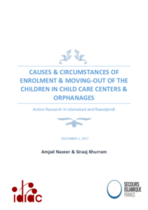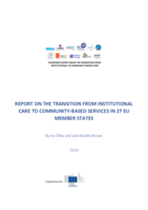Causes & Circumstances of Enrolment & Moving-Out of the Children in Child Care Centers & Orphanages
The aim of this study has been to assess the reasons for the increased enrolment of children into orphanages and child care centres. An action research was conducted in Islamabad and Rawalpindi between November and December 2017 to assess the situation and identify the causes and circumstance that bring in and compel orphans and vulnerable children to move out after a certain age or grade.


